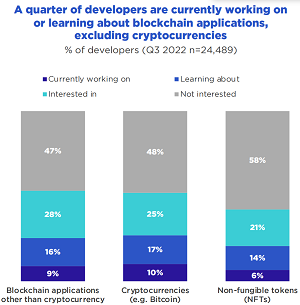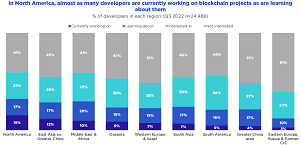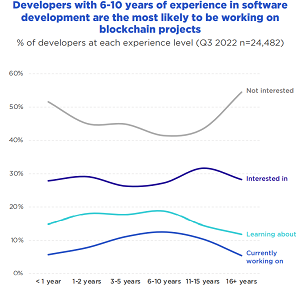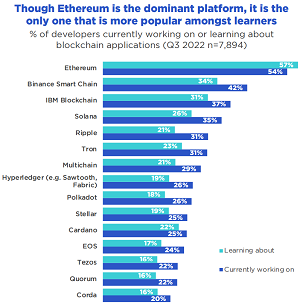News
Practical Blockchain: Dev Report Ranks 15 Non-Cryptocurrency Platforms
A just-relasedreport on the state of non-cryptocurrency blockchain development shows how developers and learners interact with 15 different platforms.
"The State of Blockchain Development" is one part of the most recent edition of SlashData's "State of the Developer Nation" report, an ambitious yearly endeavor that reports on the latest trends from more than 26,000 developers.
The newest release is based on data collected from more than 100,000 developers worldwide in Q3 2022. The report states that about a quarter of the Q3 respondents (24,489) are currently working on or learning about blockchain applications, excluding cryptocurrencies.
 [Click on image for larger view.] Engagement with Blockchain Technologies (source: SlashData).
[Click on image for larger view.] Engagement with Blockchain Technologies (source: SlashData).
As the graphic above shows, SlashData collected data on three blockchain technologies: cryptocurrencies, non-cryptocurrency apps and non-fungible tokens (NFTs). While noting that cryptocurrencies are most salient to developers, with 26 percent of respondents either learning about or currently working on such projects, SlashData said non-cryptocurrency blockchain technologies aren't far behind, with 25 percent of developers being similarly involved. The blockchain chapter of the report focuses only on blockchain applications other than cryptocurrencies because SlashData believes they have the widest range of use cases and so have the most potential to shape the world.
The report shows that in North America (identified as a hotbed of blockchain development along with East Asia), almost as many developers are currently working on blockchain projects as are learning about them.
 [Click on image for larger view.] A Regional View of Engagement with Blockchain Applications (source: SlashData).
[Click on image for larger view.] A Regional View of Engagement with Blockchain Applications (source: SlashData).
It further indicates that developers most likely to be working on blockchain projects have six to 10 years of experience.
 [Click on image for larger view.] How Does Experience Affect Engagement With Blockchain Applications? (source: SlashData).
[Click on image for larger view.] How Does Experience Affect Engagement With Blockchain Applications? (source: SlashData).
"It's likely that these developers have reached the point in their career where their technical skills are sufficiently advanced to enable them to work on such demanding projects," SlashData said. "On the other hand, we see that the least and most experienced developers are the most likely to be disinterested in such projects. Those with less than a year under their belts have yet to build their knowledge, while the most experienced developers may be looking to maintain some stability in their career and are reluctant to change tack."
SlashData observed that many of the least-experienced developers are actively learning about blockchain technologies, thus constituting a strong pipeline of future contributors.
"Developers with 11-15 years of experience under their belts show the most passive interest in blockchain applications -- whilst they aren't learning about or working on such projects, 32 percent are interested in some way," SlashData further commented. "These developers are at the zenith of their careers and whilst they are some of the least likely to be learning about the technology, they are also some of the most likely to be currently working on it. These developers are likely keeping a close eye on developments in the space -- should they spot an opportunity, they will be able to pivot their considerable experience to become effective contributors to the space."
The report also found that Ethereum was the most dominant platform while also being the only one more popular among learners than developers. SlashData said that meant the Ethereum ecosystem is in good shape, being large and enjoying a healthy pipeline of new contributors.
 [Click on image for larger view.] Which Blockchain Platforms Are Most Popular? (source: SlashData).
[Click on image for larger view.] Which Blockchain Platforms Are Most Popular? (source: SlashData).
"Despite the hype, blockchain technologies are still somewhat in their infancy," SlashData said in conclusion. "Blockchain, much like cloud computing fifteen or so years ago, has the potential to underpin and enable many other technologies and experiences, but as we saw earlier, only 9 percent of developers are currently working on such projects. Rather than affecting an instant technological transformation, blockchain technologies have the opportunity to become a foundational technology on which our digital experience sits, much like TCP-IP -- the building blocks of the internet -- and developers will be key players in shaping this particular view of the future."
About the Author
David Ramel is an editor and writer at Converge 360.